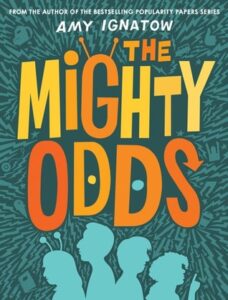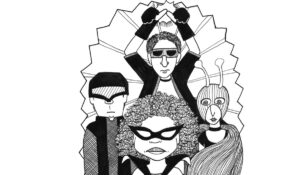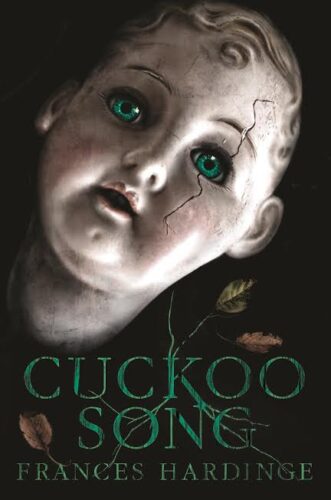 The Mighty Odds
The Mighty Odds
By Amy Ignatow
Amulet Books (an imprint of Abrams)
$15.95
ISBN: 978-1-4197-1271-5
Ages 10 and up
On shelves September 13th
If you could have one weird superpower, what would it be? Not a normal one, mind you. We’re not doing a flight vs. invisibility discussion here. The power would have to be extraordinary and odd. If it’s completely useless, all the better. Me? I think I’d like my voice to be same as the voice you hear in your head when you’re reading something. You know that voice? That would be my superpower. A good author can crank this concept up to eleven if they want to. Enter, Amy Ignatow. She is one of the rare authors capable of making me laugh out loud at the back covers of her books. For years she’s penned The Popularity Papers to great success and acclaim. Now that very realistic school focus is getting a bit of a sci-fi/fantasy kick in the pants. In The Mighty Odds, Ignatow takes the old misfits-join-together-to-save-the-world concept and throws in a lot of complex discussions of race, middle school politics, bullying, and good old-fashioned invisible men. The end result is a 21st century superhero story for kids that’s keeps you guessing every step of the way.
A school bus crashes in a field. No! Don’t worry! No one is killed (that we can tell). And the bus was just full of a bunch of disparate kids without any particular connection to one another. There was the substitute teacher and the bus driver (who has disappeared). And there was mean girl Cookie (the only black girl in school and one of the most popular), Farshad (nicknamed “Terror Boy” long ago by Cookie), Nick (nerdy and sweet), and Martina (the girl no one notices, though she’s always drawing in her sketchbook). After the accident everything should have just gotten back to normal. Trouble is, it didn’t. Each person who was on or near the bus when the accident occurred is a little bit different. It might be a small thing, like the fact that Martina’s eyes keep changing color. It might be a weird thing, like how Cookie can read people’s minds when they’re thinking of directions. It might be a powerful thing, like Farad’s super strength in his thumbs. Or it might be a potentially powerful, currently weird thing like Nick’s sudden ability to teleport four inches to his left. And that’s before they discover that someone is after them. Someone who means them harm.
Superhero misfits are necessarily new. Remember Mystery Men? This book reminded me a lot of that old comic book series / feature film. In both cases superpowers are less a metaphor and more a vehicle for hilarity. I read a lot of books for kids but only once in a while do I find one enjoyable enough to sneak additional reads of on the sly. This book hooked me fairly early on, and I credit its sense of humor for that. Here’s a good example of it. Early in the book Cookie and a friend are caught leaving the field trip for their own little side adventure. The kids in their class speculate what they got up to and one says that clearly they got drunk. Farshad’s dry wit then says, “… because two twelve-year-olds finding a bar in Philadelphia that would serve them at eleven A.M. was completely plausible.” Add in the fact that they go to “Deborah Read Middle School” (you’ll have to look it up) and I’m good to go.
Like I’ve said, the book could have just been another fun, bloodless superhero misfit storyline. But Ignatow likes challenges. When she wrote the Popularity Papers books she gave one of her two heroines two dads and then filled the pages with cursive handwriting. Here, her heroes are a variety of different races and backgrounds, but this isn’t a Benetton ad. People don’t get along. Cookie’s the only black kid in her school and she’s been very careful to cement herself as popular from the start. When her mom moved them to Muellersville, Cookie had to be careful to find a way to become “the most popular and powerful person in school.” Martina suggests at one point that she likes being angry, and indeed when the world starts to go crazy on her the thing that grounds her, if only for a moment, is anger. And why shouldn’t she be angry? Her mom moved her away from her extended family to a town where she knew no one, and then her mother married a guy with two kids fairly fast. Cookie herself speculates about the fact that she probably has more in common with Farshad than she’d admit. “He was the Arab Kid, just like Cookie was the Black Girl and Harshita Singh was the Indian Girl and Danny Valdez was the Hispanic Guy and Emma Lee was the Asian Chick. They should have all formed a posse long ago and walked around Muellersville together, just to freak people out.” Cookie realizes that she and Farshad need to have one another’s backs. “It was one thing to be a brown person in Muellersville and another to be a brown person in Muellersville with superpowers.” At this point in time Ignatow doesn’t dig any deeper into this, but Cookie’s history, intentions, and growth give her a depth you won’t find in the usual popular girl narrative.
For the record, I have a real appreciation for contemporary books that feature characters that get almost zero representation in books. For example, one of the many things I love about Tom Angleberger’s The Qwikpick Papers series is that one of the three heroes is Jehovah’s Witness. In this book, one of the kids that comes to join our heroes is Amish. Amish kids are out there. They exist. And they almost never EVER get heroic roles in stories about a group of friends. And Abe doesn’t have a large role in this book, it’s true, but it’s coming.
Having just one African-American in the school means that you’re going to have ignorant other characters. Cookie has done a good job at getting the popular kids in line, but that doesn’t mean that everyone is suddenly enlightened. Anyone can be tone deaf. Even one of our heroes, which in this case means Nick’s best friend, the somewhat ADD, always chipper Jay. Now I’ve an odd bit of affection for Jay, and not just because in his endless optimism he honestly thinks he’ll get permission to show his class Evil Dead Two on the field trip bus (this may also mark the first time an Evil Dead film has been name dropped in a middle grade novel, by the way). The trouble comes when he talks about Cookie. He has a tendency to not just be tone deaf but veering into really racially questionable territory when he praises her. Imagine a somewhat racist Pepe Le Pew. That’s Jay. He’s a small town kid who’s only known a single solitary black person his entire life and he’s enamored with her. Still, that’s no excuse for calling her “my gorgeous Nubian queen” or saying someday they’ll “make coffee-colored babies.” I expected a little more a comeuppance for Jay and his comments, but I suppose that’ll have to wait for a future book in the series. At the very least, his words are sure to raise more than few eyebrows from readers.
Funny is good. Great even. But funny doesn’t lift a middle grade book out of the morass of other middle grade books that are clogging up the bookstores and libraries of the world. To hit home you need to work just a smidgen of heart in there. A dose of reality. Farad’s plight as the victim of anti-Muslim sentiment is very real, but it’s also Nick’s experiences with his dying/dead father that do some heavy lifting. As you get to know Nick, Ignatow sprinkles hints about his life throughout the text in a seamless manner. Like when Nick is thinking about weird days in his life and flashes back to the day after his dad’s funeral. He and his mom had “spent the entire day flopped on the couch, watching an impromptu movie marathon of random films (The Lord of the Rings, They Live, Some Like It Hot, Ghostbusters, and Babe) and eating fancy stuff from the gift baskets that people had sent, before finally getting up to order pizza.” There’s a strong smack of reality in that bit, and there are more like it in the book. A funny book that sucker punches your heart from time to time makes for good reading.
 Lest we forget, this is an illustrated novel. Ignatow makes the somewhat gutsy choice of not explaining the art for a long time. Long before we even get to know Martina, we see her in various panels and spreads as an alien. In time, we learn that the art in this book is all her art, and that she draws herself as a Martian because that’s what her sister calls her. Not that you’ll know any of this for about 125 pages. The author makes you work to get at that little nugget of knowledge. By the way, as a character, Martina the artist is fascinating. She’s sort of the Luna Lovegood of the story. Or, as Nick puts it, “She had a sort of almost absentminded way of saying things that shouldn’t have been true but probably were.” There is one tiny flub in the art when Martina draws all the kids as superheroes and highlights Farshad’s thumbs, though at that point in the storyline Martina wouldn’t know that those are his secret weapons. Other than that, it’s pretty perfect.
Lest we forget, this is an illustrated novel. Ignatow makes the somewhat gutsy choice of not explaining the art for a long time. Long before we even get to know Martina, we see her in various panels and spreads as an alien. In time, we learn that the art in this book is all her art, and that she draws herself as a Martian because that’s what her sister calls her. Not that you’ll know any of this for about 125 pages. The author makes you work to get at that little nugget of knowledge. By the way, as a character, Martina the artist is fascinating. She’s sort of the Luna Lovegood of the story. Or, as Nick puts it, “She had a sort of almost absentminded way of saying things that shouldn’t have been true but probably were.” There is one tiny flub in the art when Martina draws all the kids as superheroes and highlights Farshad’s thumbs, though at that point in the storyline Martina wouldn’t know that those are his secret weapons. Other than that, it’s pretty perfect.
It’s also pretty clearly middle school fare, if based on language alone. You’ve got kids leaving messages on cinderblocks that read “Nolite te bastardes carborundorum” or “Don’t let the bastards get you down.” That may be the most realistic middle school detail I’ve read in a book in a long time. The bullying is systematic, realistic, and destructive (though that’s never clear to the people doing the bullying). A little more hard core than what an elementary school book might discuss. And Cookie is a superb bully. She’s honestly baffled when Farad confronts her about what she’s done to him with her rumors.
A word of warning to the wise: This is clearly the first book in a longer series. When you end this tale you will know the characters and know their powers but you still won’t know who the bad guys are exactly, why the kids got their powers (though the bus driver does drop one clue), or where the series is going next. For a story where not a lot of time passes, it really works the plotting and strong characterizations in there. I like middle grade books that dream big and shoot for the moon. “The Mighty Odds” does precisely that and also works in some other issues along the way. Just to show that it can. Great, fun, silly, fantastical fantasy work. A little smarter and a little weirder than most of the books out there today.
On shelves September 13th.
Source: Galley sent from publisher for review.
Readalikes:
- The Girl With the Silver Eyes by Willo Davis Roberts
- Milo: Sticky Notes and Brain Freeze by Alan Silberberg
- Alcatraz Versus the Evil Librarians by Brandon Sanderson
Professional Reviews:




IT’S SO GOOD and I can’t wait until everyone reads it! *incoherent fangirl flailing*